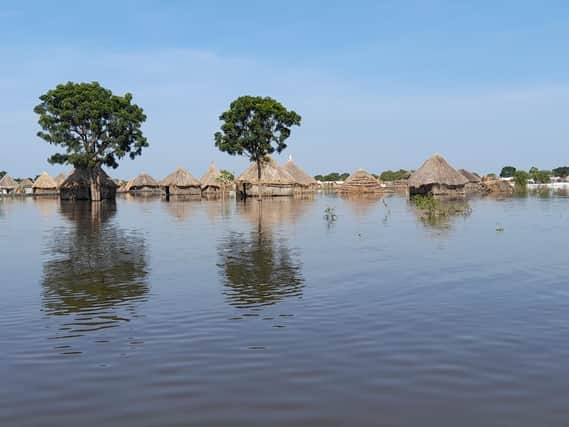The starkest reminder of the injustice of climate change is South Sudan - Sally Foster-Fulton


It is a word which evokes images of battlefields with many casualties, but in this context, it is the frontline of a war being waged daily by our changing climate. Weather systems have changed, are changing, and in South Sudan, 2021 has been a year of unprecedented rains and the worst flooding in six decades. Flooding has not only affected South Sudan but also the neighbouring countries of Congo and Uganda, causing rivers to burst their banks and inundate vast swathes of land.
In the week before COP26 began in Glasgow the UN Refugee Agency, UNHCR, spelled out clearly how climate change is to blame for the most recent flooding in South Sudan. At least 700,000 people have been affected, with rains expected to cause disruption for the remainder of the year. Yet more homes, crops and livestock have been swept away and people have been forced to move to temporary shelters on higher ground. The pattern of the two previous years is being repeated for the third year in a row. In some areas, flood waters from last year, still haven’t receded. A UNHCR spokesman used that word ‘frontline’ to emphasise the utter devastation and described the people of South Sudan as the ‘collateral damage of a battle they did not pick’.
Advertisement
Hide AdAdvertisement
Hide AdWhat this means is that even more people are being pushed closer to famine. Finding food is a constant challenge. Thanks to the Scottish Government, Christian Aid has recently been awarded funding (£120,500) to help in the humanitarian response to some of the most vulnerable families. This money is being used in Unity State, northern South Sudan, through our partner UNIDOR, to supply emergency cash grants, farming seeds, tools and fishing kits to families in desperate need.
When the Scottish Government funding was announced last month, International Development Minister Jenny Gilruth said: “The situation in South Sudan is a desperate one, and we stand ready to act when confronted with such a pressing emergency. We know that more than seven million people, more than half the population, face hunger – and this is where the Humanitarian Emergency Fund can play a part. The Scottish Government is committed to fulfilling its role as a responsible and compassionate global citizen and this aid will provide essential help to those in desperate need.”
The funding from the Scottish Government is allowing us to reach some of the most vulnerable communities in Unity State but the reality is that over seven million people simply don’t have enough to eat. That’s more people than the entire population of Scotland. With the messages and commitments from COP fresh in our ears, if ever we needed a starker reminder of the injustice of climate change, which impacts those who have done the least to cause it, this is it.
To find out more about our Christmas Appeal, which this year is focused on South Sudan, please go to: http://caid.org.uk/christmas2021
Sally Foster-Fulton, Head of Christian Aid Scotland
Comments
Want to join the conversation? Please or to comment on this article.